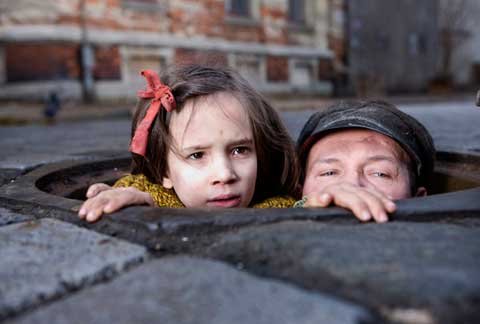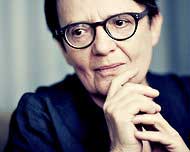
Published: December 2, 2011

Milla Bańkowicz as Krystyna Chiger and Robert Więckiewicz as Leopold Socha in In Darkness. (Photo by Jasmin Marla Dichant, courtesy of Sony Pictures Classics)
AT first the Polish film director Agnieszka Holland wanted nothing to do with the script that became “In Darkness,” a new drama based on the true story of Jews in Poland who escaped the Nazis by hiding in sewers. She had already made two films about the Holocaust, “Angry Harvest” in 1985 and “Europa Europa” in 1990, both of which were nominated for Academy Awards, and she had no desire to revisit that wrenching subject.

Mark Veltman for The New York Times
The director Agnieszka Holland, initially resisted making “In Darkness,” a Holocaust film based on a true story.
But David Shamoon, a Canadian advertising executive who had written the screenplay, his first to be produced, and taken it to Ms. Holland, thought otherwise. He had been drawn to the story, which he first read about in a Toronto newspaper nearly a decade ago, by a particularly unlikely detail that he thought would also intrigue Ms. Holland: the Jews had been hidden beneath the streets of Lvov by a Polish sewer worker, Leopold Socha, who was also a somewhat anti-Semitic Roman Catholic, and a petty thief with a prison record.
“This guy was not a hero, yet he ended up doing the right thing, which to me is the true version of heroism,” said Mr. Shamoon, 64, who was born into a Jewish family that fled Iraq in 1941 to settle first in India and then in Iran, where he was raised before attending college in the United States and moving to Canada. “It’s a difficult thing, almost counterintuitive, and yet people do it. We’d all like to think we would know what to do. But if I were in his shoes, would I have done those things?”
So Mr. Shamoon was persistent, submitting revised versions of the script to Ms. Holland, and eventually her reluctance began to melt. As “the story started to call me,” she said, “it entered me and became part of my system, even as I was telling them no.” In addition she acknowledged that the “technical and artistic challenge of shooting 80 percent of the film in the darkness” of real and specially constructed sewers “is something that attracts a filmmaker, because you don’t get many chances of this kind in your career.”
But she also wanted to provide a corrective to what she called “several Holocaust movies I’d seen in recent years that I found very fake in some way, both artistically and humanly.” Ms. Holland said she did not want to name them but, speaking generally, she contended that when English is used, for instance, “in some ways you make it conventional: It’s not real, we are playing.”
That meant translating Mr. Shamoon’s English-language script, which draws on Robert Marshall’s book “In the Sewers of Lvov,” back into the languages of the real-life characters: Polish, German, Yiddish and Ukrainian. And that, in turn, also meant forgoing English-speaking box-office names in the lead roles.
“It is a danger if you have a star” for a story like this, Ms. Holland said. “I don’t have anything against the stars. Some of them are very good actors. But of course if you are watching Brad Pitt, you are not watching a sewer worker, and that is something so big that it is very difficult to overlook.”
Aware that the film’s success or failure would depend in large part on how convincing the Socha character was, Ms. Holland immediately thought to turn to Robert Wieckiewicz. Though almost unknown in the English-speaking world, Mr. Wieckiewicz, 44, “is probably the most interesting Polish actor of his generation,” she said, “able to do two things that I’m not sure I’ve ever seen before, which is to play in the same moment, not one after the other, being very brutal and primitive but also very subtle and emotional.”
“Mixing those two things was the key to Socha,” added Ms. Holland, whose mother was raised as Roman Catholic and whose Jewish father lost his parents in the Holocaust.
Mr. Wieckiewicz, who has just been cast by the director Andrzej Wajda to play Lech Walesa, the leader of the Solidarity movement who became president of Poland, felt he knew something about the working-class world in which Socha lived: his own father is a miner, his mother a nurse, and before World War II a grandmother had worked as a cook for a Jewish family.
“Socha is a very simple man, a physical worker who is not educated, who doesn’t function on some high, lofty level of perception about the world,” Mr. Wieckiewicz said in a telephone interview from Warsaw. “The way he acts is very instinctual, impulsive even. He’s not a crystal-clear character from the moral point of view, someone who makes a firm resolution: ‘Starting today I will be a good man.’ But he has the capability of doing good, and over the 14 months that potential allows him to transform himself.”
Initially, Mr. Wieckiewicz noted, Socha, though not necessarily anti-Semitic, is certainly “influenced by certain anti-Semitic thinking and trends of the time.” But the Jews he was trying to help, at first for money but later out of conviction, are also shown to have flawed characters.
“We didn’t pull any punches,” Mr. Shamoon said in a telephone interview. “From the very beginning I did not want them to be faceless, holier-than-thou victims. I wanted to be realistic. Some of them were really not nice people at all, and that is actually another of the things that attracted me to this story, that some of the people Socha was trying to save were difficult and not very thankful to him.”
Of the survivors who emerged in the summer of 1944 from the sewers of Lvov, once called Lemberg and today a part of Ukraine known as Lviv, only Krystyna Chiger, 76, is still alive. After migrating from Poland to Israel in 1957 she came to the United States in 1968, and then practiced dentistry in Manhattan. Retired, she lives on Long Island with her husband, Marian, also a survivor of the Polish ghettos.
Ms. Chiger said she had always avoided movies about the Holocaust, “because it is just too strong for me.” But she was curious about how her own experience would be portrayed on the screen, and when she saw “In Darkness” at the Toronto International Film Festival in September, she emerged with the feeling that Ms. Holland “was so realistic that I felt I am back in the sewer and am smelling it,” she said.
“I was very happy and said to Agnieszka that this is not like some Hollywood version,” Ms. Chiger said in an interview last month at her home. “I think she did a very good job, showing the positive and the negative and how they meld together. She showed the selfishness, the goodness. It was what really happened.”
Early reviews of “In Darkness,” considered a strong contender for the short list for the foreign-language Oscar, have emphasized the same point. Variety described the film as “harrowing,” and The Hollywood Reporter said the filmmakers “successfully create an oppressive, suffocating, terrifying subterranean world where everything could end in a second or go on indefinitely.”
Though “In Darkness” has had only a short Oscar-qualifying run in Poland, the hitherto-ignored story of what have come to be known as “Socha’s Jews” has become a sensation there. Ms. Chiger’s 2008 account of her experience, “The Girl in the Green Sweater,” has just been published in Polish, as has her father’s memoirs of the entire World War II period. Her book has become a best seller there, and during a book tour in October she was besieged with interviews and public appearances.
“I think the book is selling so well because it’s about a Polish guy who saves lives, a Polish guy shown in a positive way,” Ms. Chiger said. “He’s not the killer, the one who cooperates with the Germans. He’s the one who saves the Jews, and this is what they like about it, that it puts them now in a different light.
“The one thing that always bothered me was that the Germans, they admit their guilt, ‘Yes we did it.’ But Poles never admit it. They always say, ‘We were victims too.’ And they were. But that doesn’t mean you have to go and show to the Germans ‘This is a Jewish family here.’ So it is complicated, and they are trying right now, the new generation, the youth, they want to find their roots” and know their history.
But some questions remain that simply cannot be answered, all of those involved in the film agree. Perhaps the most fundamental is: Why did Socha put his own life — and those the lives of his wife and daughter — at risk for the sake of people who were utter strangers to him?
“This is the mystery of the human heart,” Mr. Wieckiewicz said. “From today’s perspective we have a tendency not to help when someone knocks at our door and wants a bowl of soup or a coin. So I am fascinated by those people who in wartime circumstances, with death threatening at every instance, meet another human being and say, ‘I will give you a helping hand.’ It’s a fantastic secret, one I am never going to be able to solve.”
Source:
